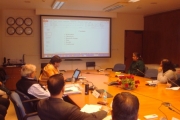NCAER along with the Indira Gandhi Institute for Development Research, Mumbai and the National Institute of Public Finance and Policy, New Delhi is conducting an impact assessment study of the Government of India’s Digital India Land Records Modernization Programme in Himachal Pradesh (by NCAER), Maharashtra (IGIDR) and Rajasthan (NIPFP). In this round table, a discussion on the synthesis report of the three states, being put together by NCAER, was held.
The participants in this discussion included, Peter Rabley (on video call), Venture-Partner, Omidyar Network (ON), Shreya Deb, Principal (Investments), Omidyar Network and Sushant Kumar, Senior Manager (Intellectual Capital), Omidyar Network (on video call) apart from the members of the Technical Advisory Committee. The team members from all the three Impact Assessment Agencies (IAAs) – NCAER, IGIDR and NIPFP were present.
The Technical Advisory Committee of this study comprises of Namita Wahi, Centre for Policy Research (CPR), Jagdeesh Rao Puppala, Foundation for Ecological Security (FES, on video call), Pranab Ranjan Chaudhary, Natural Resources Management Consultants (NRMC), Sanjoy Patnaik, Centre for Rights and Resources and Deepika Jha, representing Amlanjyoti Goswami, Indian Institute for Human Settlements (IIHS).
Deepak Sanan (NCAER), Senior Advisor for the project, coordinated the proceedings of the meeting. D B Gupta (NCAER), leads the project at NCAER. Shekhar Shah, Director-General, NCAER, who joined the discussions on video call, welcomed the Omidyar Network team and all the TAC members and explained the context of the discussions. He acknowledged the support of ON for this impact assessment and also highlighted the significance of a joint effort that was reflected in the course of this work in capacity building in this area of research. Deepak Sanan, provided an overview of the pilot impact assessment with respect to its inception, training sessions, the role of TAC meetings in continuous review of the work and finally the next steps to disseminate the findings and policy suggestions stemming from the impact assessment.
This was followed by a presentation on the synthesis report by NCAER’s Prerna Prabhakar who detailed the salient features of the study and its major findings and Deepak Sanan flagged the lessons learnt from this impact assessment for expanding this work to other states and comparative analysis at the national level. He also talked about the way forward with respect to the DI-LRMP design where he discussed the idea of a Property Record and Services Index (PRSI) to rank states in terms of digitization efforts as well as well as real time updation of records. The use of such an index to incentivise the states’ efforts at securing comprehensive land records updated in real time by linking central funding to performance in this regard was stressed by the synthesis report.
This was followed by extensive discussions around the impact assessment findings as well as the suggestions on assessing performance and related inputs for DILRMP design. The discussion concluded with an action plan on dissemination of the impact assessment findings.













